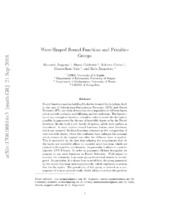Wave-shaped round functions and primitive groups
Peer reviewed, Journal article
Accepted version

View/
Date
2019Metadata
Show full item recordCollections
Original version
https://doi.org/10.3934/amc.2019004Abstract
Round functions used as building blocks for iterated block ciphers, both in the case of Substitution-Permutation Networks (SPN) and Feistel Networks (FN), are often obtained as the composition of different layers. The bijectivity of any encryption function is guaranteed by the use of invertible layers or by the Feistel structure. In this work a new family of ciphers, called wave ciphers, is introduced. In wave ciphers, round functions feature wave functions, which are vectorial Boolean functions obtained as the composition of non-invertible layers, where the confusion layer enlarges the message which returns to its original size after the diffusion layer is applied. Efficient decryption is guaranteed by the use of wave functions in FNs. It is shown how to avoid that the group generated by the round functions acts imprimitively, a serious flaw for the cipher. The primitivity is a consequence of a more general result, which reduce the problem of proving that a given FN generates a primitive group to proving that an SPN, directly related to the given FN, generates a primitive group. Finally, a concrete instance of real-world size wave cipher is proposed as an example, and its resistance against differential and linear cryptanalyses is also established.